The global, ppGpp-mediated stringent response to amino acid starvation in Escherichia coli
- PMID: 18430135
- PMCID: PMC3719176
- DOI: 10.1111/j.1365-2958.2008.06229.x
The global, ppGpp-mediated stringent response to amino acid starvation in Escherichia coli
Abstract
The stringent response to amino acid starvation, whereby stable RNA synthesis is curtailed in favour of transcription of amino acid biosynthetic genes, is controlled by the alarmone ppGpp. To elucidate the extent of gene expression effected by ppGpp, we designed an experimental system based on starvation for isoleucine, which could be applied to both wild-type Escherichia coli and the multiauxotrophic relA spoT mutant (ppGpp(0)). We used microarrays to profile the response to amino acid starvation in both strains. The wild-type response included induction of the general stress response, downregulation of genes involved in production of macromolecular structures and comprehensive restructuring of metabolic gene expression, but not induction of amino acid biosynthesis genes en masse. This restructuring of metabolism was confirmed using kinetic Biolog assays. These responses were profoundly altered in the ppGpp(0) strain. Furthermore, upon isoleucine starvation, the ppGpp(0) strain exhibited a larger cell size and continued growth, ultimately producing 50% more biomass than the wild-type, despite producing a similar amount of protein. This mutant phenotype correlated with aberrant gene expression in diverse processes, including DNA replication, cell division, and fatty acid and membrane biosynthesis. We present a model that expands and functionally integrates the ppGpp-mediated stringent response to include control of virtually all macromolecular synthesis and intermediary metabolism.
Figures

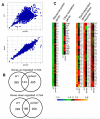
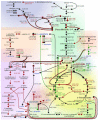
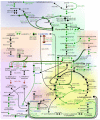
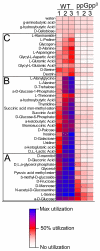
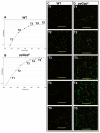
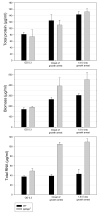

Similar articles
-
Rapid Curtailing of the Stringent Response by Toxin-Antitoxin Module-Encoded mRNases.J Bacteriol. 2016 Jun 27;198(14):1918-1926. doi: 10.1128/JB.00062-16. Print 2016 Jul 15. J Bacteriol. 2016. PMID: 27137501 Free PMC article.
-
The ObgE/CgtA GTPase influences the stringent response to amino acid starvation in Escherichia coli.Mol Microbiol. 2009 Jul;73(2):253-66. doi: 10.1111/j.1365-2958.2009.06767.x. Epub 2009 Jun 23. Mol Microbiol. 2009. PMID: 19555460 Free PMC article.
-
Inorganic polyphosphate and the stringent response coordinately control cell division and cell morphology in Escherichia coli.mBio. 2025 Feb 5;16(2):e0351124. doi: 10.1128/mbio.03511-24. Epub 2024 Dec 27. mBio. 2025. PMID: 39727417 Free PMC article.
-
Control of bacterial transcription, translation and replication by (p)ppGpp.Curr Opin Microbiol. 2008 Apr;11(2):100-5. doi: 10.1016/j.mib.2008.02.001. Epub 2008 Mar 24. Curr Opin Microbiol. 2008. PMID: 18359660 Review.
-
ppGpp: a global regulator in Escherichia coli.Trends Microbiol. 2005 May;13(5):236-42. doi: 10.1016/j.tim.2005.03.008. Trends Microbiol. 2005. PMID: 15866041 Review.
Cited by
-
RNA Sequencing Identifies a Common Physiology in Vancomycin- and Ciprofloxacin-Tolerant Staphylococcus aureus Induced by ileS Mutations.Antimicrob Agents Chemother. 2020 Sep 21;64(10):e00827-20. doi: 10.1128/AAC.00827-20. Print 2020 Sep 21. Antimicrob Agents Chemother. 2020. PMID: 32690649 Free PMC article.
-
Enhanced access to the human phosphoproteome with genetically encoded phosphothreonine.Nat Commun. 2022 Nov 24;13(1):7226. doi: 10.1038/s41467-022-34980-5. Nat Commun. 2022. PMID: 36433969 Free PMC article.
-
Bacterial lifestyle shapes stringent response activation.Trends Microbiol. 2013 Apr;21(4):174-80. doi: 10.1016/j.tim.2013.01.002. Epub 2013 Feb 16. Trends Microbiol. 2013. PMID: 23419217 Free PMC article. Review.
-
Bacterial Chromosome Replication and DNA Repair During the Stringent Response.Front Microbiol. 2020 Aug 28;11:582113. doi: 10.3389/fmicb.2020.582113. eCollection 2020. Front Microbiol. 2020. PMID: 32983079 Free PMC article. Review.
-
Multilevel comparative analysis of the contributions of genome reduction and heat shock to the Escherichia coli transcriptome.BMC Genomics. 2013 Jan 16;14:25. doi: 10.1186/1471-2164-14-25. BMC Genomics. 2013. PMID: 23324527 Free PMC article.
References
-
- Aberg A, Shingler V, Balsalobre C. (p)ppGpp regulates type 1 fimbriation of Escherichia coli by modulating the expression of the site-specific recombinase FimB. Molecular microbiology. 2006;60:1520–1533. - PubMed
-
- Artsimovitch I, Patlan V, Sekine S, Vassylyeva MN, Hosaka T, Ochi K, Yokoyama S, Vassylyev DG. Structural basis for transcription regulation by alarmone ppGpp. Cell. 2004;117:299–310. - PubMed
-
- Barker MM, Gaal T, Gourse RL. Mechanism of regulation of transcription initiation by ppGpp. II. Models for positive control based on properties of RNAP mutants and competition for RNAP. Journal of molecular biology. 2001a;305:689–702. - PubMed
-
- Barker MM, Gaal T, Josaitis CA, Gourse RL. Mechanism of regulation of transcription initiation by ppGpp. I. Effects of ppGpp on transcription initiation in vivo and in vitro. Journal of molecular biology. 2001b;305:673–688. - PubMed
-
- Battesti A, Bouveret E. Acyl carrier protein/SpoT interaction, the switch linking SpoT-dependent stress response to fatty acid metabolism. Molecular microbiology. 2006;62:1048–1063. - PubMed
Publication types
MeSH terms
Substances
Grants and funding
LinkOut - more resources
Full Text Sources
Other Literature Sources
Molecular Biology Databases
Research Materials

